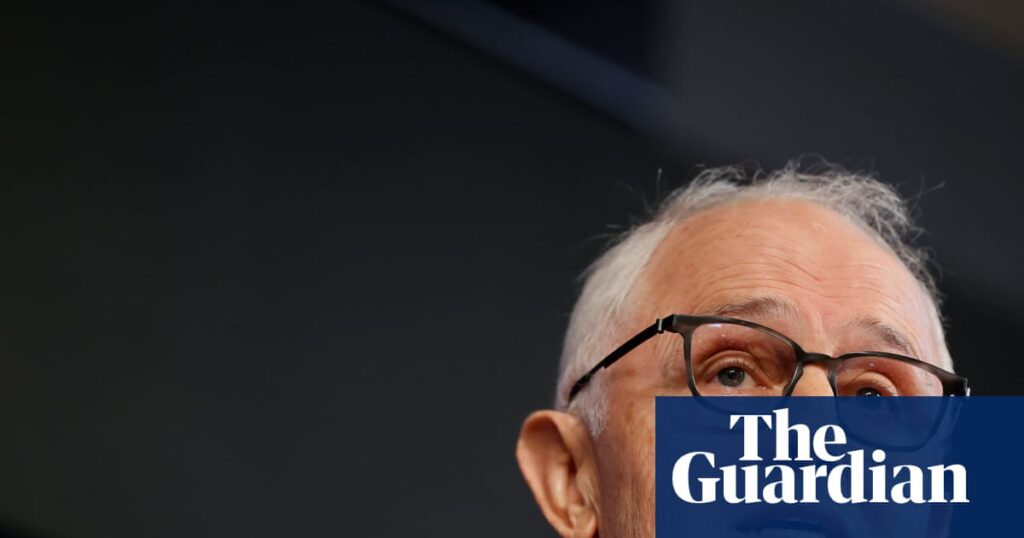
The former Australian Prime Minister, Malcolm Turnbull, has sharply criticized the Liberal Party’s recent decision to abandon its net zero emissions target, accusing the party of engaging in a “Trumpian campaign against renewables.” Turnbull’s comments come in response to the opposition’s move to scrap its 2050 net zero target, a decision that has sparked significant debate within the party and beyond.
While moderate factions within the Liberal Party express concern about the potential impact on urban electorates, conservative members and campaigners have praised the decision. The party’s choice to unwind Labor’s 2035 and renewable energy pledges has been labeled a “disaster” by climate groups, yet celebrated by right-wing advocates.
Turnbull’s Critique and Party Dynamics
Turnbull, who was ousted in a 2018 coup partly over energy and climate policy, did not mince words in his criticism. Speaking to Guardian Australia, he remarked, “This is what happens when you outsource your policy development to Sky News and the rightwing media echo chamber.”
He further asserted that the decision would reinforce the perception that the Liberal Party is not serious about addressing climate change. “No amount of nuance or qualifying footnotes will change that impression,” Turnbull added, using a colorful metaphor to describe the party’s actions.
“The Liberals’ decision to abandon the 2050 net zero target will simply confirm to most Australians that the parliamentary party does not take climate change seriously and wants to join a Trumpian campaign against renewables.” — Malcolm Turnbull
Meanwhile, right-wing campaign group Advance, which had been advocating for the Coalition to abandon net zero, hailed the decision as a “major victory.” Advance’s director, Matthew Sheahan, communicated to supporters that this shift represented a triumph over “activists and elites.”
Internal Party Reactions and Political Ramifications
The decision has also drawn reactions from other political figures. Nationals leader David Littleproud stated that the Liberal policy aligns with his party’s stance and expressed optimism about future negotiations to establish a unified Coalition position. “We believe in climate change. We believe that we need to do something about it. That we should do our fair share,” Littleproud remarked.
Conversely, environmental groups and political opponents have been vocally critical. The Australian Conservation Foundation accused the Liberals of capitulating to fossil fuel interests, while the Climate Council warned that abandoning net zero could lead to disastrous climate outcomes.
“Walking away from net zero aligns with more than 3C of global heating and would spell disaster for Australia’s climate, economy, and household bills.” — Climate Council
Greens senator Sarah Hanson-Young described the announcement as a “train wreck,” while independent MP Zali Steggall labeled it “reckless and a massive step backwards.”
Moderate Concerns and Future Implications
Within the Liberal Party, the decision marks a significant victory for right-wing MPs over moderates, who have expressed concerns about the electoral impact. Prominent moderates, including Tim Wilson and Andrew Bragg, have voiced alarm over the potential loss of urban support.
Jason Falinski, former Liberal MP and New South Wales branch president, cautioned against the party adopting a “Nationals-lite” approach, questioning how the new policy would attract more votes.
Charlotte Mortlock, founder of Hilma’s Network, criticized the decision, suggesting it would hinder the party’s ability to regain metropolitan seats. “What I fear is the main takeaway is we are not taking climate change seriously,” she commented.
“The Coalition has a chequered history on climate … at the moment there might be movement around net zero and climate change, but you either believe in climate change and want to pursue net zero or you want to abandon it.” — Charlotte Mortlock
Experts have also weighed in on the broader implications. Tony Wood, senior fellow at the Grattan Institute, highlighted the need for consistent climate policy to maintain investor confidence. “The idea that Australia would no longer have a clear direction in the long term, but we’re just going to ‘follow everybody else’, is not very helpful for investors,” he noted.
“In what’s been proposed so far, I can’t see how it would reduce emissions, I don’t see how it would reduce prices either.” — Tony Wood
As the Liberal Party navigates this contentious policy shift, the internal and external debates are likely to continue, shaping the political landscape and influencing Australia’s climate strategy in the years to come.







